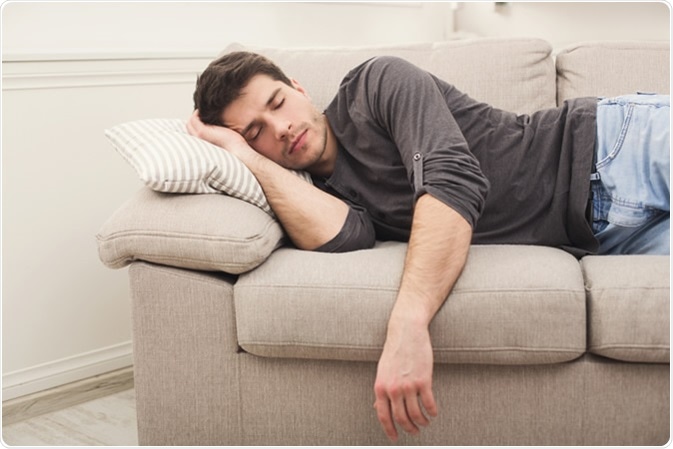Skip to:
According to CDC estimates, nearly 35% of adults in the US do not get six hours of sleep at night. Many even work through the night and miss night sleep entirely resulting in accumulation of sleep debt, which affects the body in myriad of ways including adverse effects on your immune system, appearance, and brain function.
Puffy eyes and dark circles, cravings and hunger pangs that can contribute to obesity, poor focus on tasks at work or home, frequent infections because of poor immunity are some of the ways in which our body is affected due to lack of proper sleep.

Image Credit: Prostock-studio / Shutterstock
Why Should We Sleep?
An average adult needs 6 to 8 hours of sleep everyday for optimum health and function because research shows that sleep refuels and re-energizes your body. However, studies show that over 60% of adults constantly fall short of this recommended sleep hours.
Our body summons sleep by increasing circulating levels of the neurotransmitter adenosine and by using signals from our circadian clock, which controls our daily rhythms. These two systems work together to establish the best bedtime for us. Most of us attain peak "sleepiness" levels between 12 am and 6 am and 2 pm and 4 pm.
Sleep loss takes toll on the body as well as the mind. Our circadian clock regulates our body functions including fluctuations in blood pressure, body temperature, and levels of several hormones and digestive enzymes. In a University of Chicago study on human sleep deprivation, the volunteers who slept only about 4 hours per night for 6 consecutive days experienced increased blood pressure, increase in stress hormone, cortisol, levels, and produced decreased levels of antibodies to a flu vaccine. They also showed signs of insulin resistance, a precursor of type 2 diabetes.
Sleep deprivation also causes irritability and fatigue and interferes with memory and focus resulting in impaired reaction time, judgement and vision. The more the sleep debt, the greater the adverse health effects such as weight gain, heart disease, diabetes, and even stroke.
Repairing Sleep Deprivation Effects
Adults who do not sleep the recommended hours during the working weekshould focus on making up for it during the weekend. Adequate sleep is as important as diet and exercise for healthy living. Repaying sleep debt can be challenging for those with busy schedules, but by adding a few extra hours of sleep per night in the following week goes a long way.
It could take a few weeks or even months to fully repair the adverse effects of sleep deprivation, but it is crucial that you sleep with the alarm off for a couple of days a week and wake up refreshed and relaxed. What is equally important is to avoid going back to a new debt cycle. Factor your sleep needs in to your schedule and plan your days and nights accordingly.
Key Points to Remember
Daytime Naps
- Choose the right time – Napping at the wrong time of the day can throw off your regular sleep schedule. The best naptime during the day is post lunch when the body’s energy levels starts to plummet.
- Keep it short - Make sure you take only a short nap of 20 to 30 minutes during the day. Naps that extend to an hour or more might set you up for troubled sleep at night.
- Pick the right spot – Plan your snooze well by choosing a comfortable, dim lit room, with minimal noise.
Night sleep
- Limit caffeine intake – Consuming too much caffeine after noontime can leave you alert at night and interfere with sound sleep at night
- Be active - Exercise regularly, so you are tired when you go to bed
- Reduce stimulation – allow your brain to switch off by shutting down mobiles and computers well ahead (at least an hour before) of bedtime. If you must use phones, switch on the backlighting or night light on smartphones so it is easy on the eyes. Reading a print book in bed can be a great way to relax and calm your brain.
Further Reading
Last Updated: Jan 21, 2020